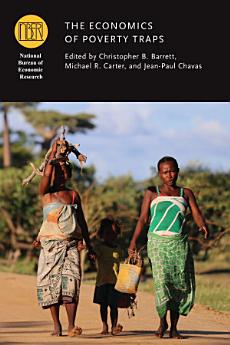The Economics of Poverty Traps
Christopher B. Barrett · Michael R. Carter · Jean-Paul Chavas
May 2024 · University of Chicago Press
Ebook
414
Pages
family_home
Eligible
info
reportRatings and reviews aren’t verified Learn More
About this ebook
What circumstances or behaviors turn poverty into a cycle that perpetuates across generations? The answer to this question carries especially important implications for the design and evaluation of policies and projects intended to reduce poverty. Yet a major challenge analysts and policymakers face in understanding poverty traps is the sheer number of mechanisms—not just financial, but also environmental, physical, and psychological—that may contribute to the persistence of poverty all over the world.
The research in this volume explores the hypothesis that poverty is self-reinforcing because the equilibrium behaviors of the poor perpetuate low standards of living. Contributions explore the dynamic, complex processes by which households accumulate assets and increase their productivity and earnings potential, as well as the conditions under which some individuals, groups, and economies struggle to escape poverty. Investigating the full range of phenomena that combine to generate poverty traps—gleaned from behavioral, health, and resource economics as well as the sociology, psychology, and environmental literatures—chapters in this volume also present new evidence that highlights both the insights and the limits of a poverty trap lens.
The framework introduced in this volume provides a robust platform for studying well-being dynamics in developing economies.
The research in this volume explores the hypothesis that poverty is self-reinforcing because the equilibrium behaviors of the poor perpetuate low standards of living. Contributions explore the dynamic, complex processes by which households accumulate assets and increase their productivity and earnings potential, as well as the conditions under which some individuals, groups, and economies struggle to escape poverty. Investigating the full range of phenomena that combine to generate poverty traps—gleaned from behavioral, health, and resource economics as well as the sociology, psychology, and environmental literatures—chapters in this volume also present new evidence that highlights both the insights and the limits of a poverty trap lens.
The framework introduced in this volume provides a robust platform for studying well-being dynamics in developing economies.
About the author
Christopher B. Barrett is the Stephen B. and Janice G. Ashley Professor of Applied Economics and Management, professor of economics, and International Professor of Agriculture at Cornell University, where he also serves as deputy dean and dean of academic affairs at the S.C. Johnson College of Business.
Michael R. Carter is professor of agricultural and resource economics at the University of California, Davis, and directs the Feed the Future Innovation Lab for Assets and Market Access and the Index Insurance Innovation Initiative (I4). He is a fellow of the Bureau for Research and Economic Analysis of Development and the American Agricultural Economics Association and a research associate of the NBER.
Jean-Paul Chavas is the Anderson-Bascom Professor of Agricultural and Applied Economics at the University of Wisconsin–Madison and a member of the board of directors of the NBER.
Michael R. Carter is professor of agricultural and resource economics at the University of California, Davis, and directs the Feed the Future Innovation Lab for Assets and Market Access and the Index Insurance Innovation Initiative (I4). He is a fellow of the Bureau for Research and Economic Analysis of Development and the American Agricultural Economics Association and a research associate of the NBER.
Jean-Paul Chavas is the Anderson-Bascom Professor of Agricultural and Applied Economics at the University of Wisconsin–Madison and a member of the board of directors of the NBER.
Rate this ebook
Tell us what you think.
Reading information
Smartphones and tablets
Install the Google Play Books app for Android and iPad/iPhone. It syncs automatically with your account and allows you to read online or offline wherever you are.
Laptops and computers
You can listen to audiobooks purchased on Google Play using your computer's web browser.
eReaders and other devices
To read on e-ink devices like Kobo eReaders, you'll need to download a file and transfer it to your device. Follow the detailed Help Center instructions to transfer the files to supported eReaders.





